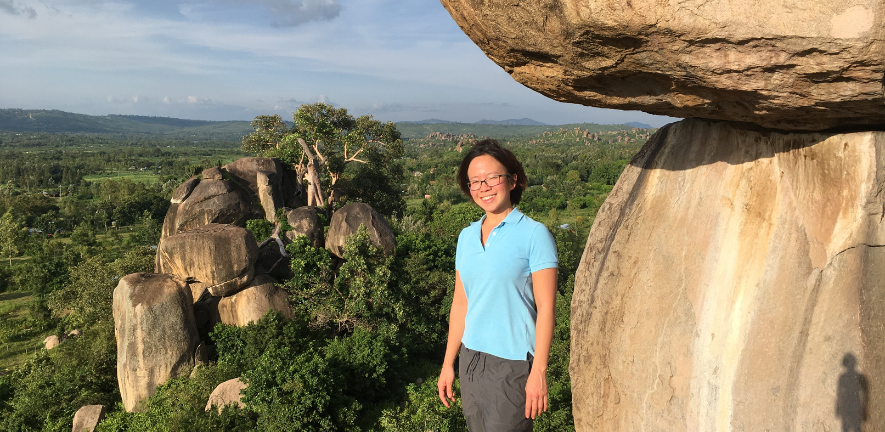
Submitted by Jane Durkin on Mon, 09/12/2024 - 13:33
Studying Plant Sciences at Cambridge can open up a wealth of career opportunities. In this series, we hear from Plant Sciences alumni about their experiences of studying here, how it shaped their careers and what they are doing now.
If you would like your alumni story featured, please email us at alumni@plantsci.cam.ac.uk.
About Trisna
Dr Trisna Tungadi completed her PhD in Plant Sciences in 2014, studying at Newnham College and working with John Carr in the plant virology lab. She continued working in the Carr lab as a postdoctoral researcher for five years, before moving to the National Institute of Agriculture Botany (NIAB) in Kent. In 2022, Trisna joined Keele University, where she is a group leader and lecturer in Plant Health.
What is your favourite memory from your time in the Department of Plant Sciences?
I truly enjoyed my time at the Department and have so many amazing memories, too many to choose from. The main highlight is the people that I met during my nine years at the Department. They are what still make the Department feel like home whenever I come back to visit.
If I must choose, teatime and beer hour would be up there on my list. Many of us from the virology lab would time our experiments precisely so we could go for morning tea together. Having worked at other places since, I have come to appreciate how these breaks created time and space to bond and connect with one another. Working in a lab often means that everyone has their own schedule, so it can be hard to take time off together. Beer hour and the annual visit to Cambridge Beer Festival is another tradition that I miss. Until today, beer from Milton brewery still reminds me of beer hour!
Alongside the vibrant social atmosphere, the Department is an intellectually stimulating place to work. Everyone is helpful, keen to learn, and open to share their expertise. There are many opportunities to learn from one another – from spontaneous discussions in the tearoom, to weekly seminars, research days and other events.
How did your time in the Department influence your career journey?
My time in the Department has played a huge role in both my professional and personal development.
I was fortunate to be part of a fantastic lab. John Carr, Alex Murphy, and Adrienne Pate from the Virology Lab are excellent mentors and colleagues. They practically taught me everything I know about plant viruses, and how to run a lab and maintain good working relationships with collaborators.
The connections and network I made from the Department have been invaluable in my career journey. Some of these people have become my research collaborators, both in the UK and abroad. Many others became close friends where we still see each other regularly.
The projects I worked on during my postdoc in the Carr Lab gave me the opportunity to travel to Kenya for field work. It made me realise that I enjoy working on projects where we can translate lab findings to the field.
I also discovered that I enjoy teaching and running capacity-building activities. In 2017 and 2018, I was part of the team from the Department, together with Carol Ibe, Emily Servante, Chloe Orland, and Jen McGaley, who organised molecular biology training for early career researchers from Africa. We then scaled up and ran the workshop in the Benin Republic for a much larger cohort of students. It was a memorable experience including the challenge of arranging delivery of lab consumables to Benin!
The Department was also where I taught my very first students, including supervisions, lab demonstrating, and looking after part II and summer students. Over the years, I witnessed several of them become successful, independent researchers themselves which was also extremely rewarding.
What have you gone on to do since leaving the Department?
After I left the Department, I worked for three years at NIAB studying the egg-laying behaviour of spotted wing drosophila, an insect pest that damages soft fruit crops. I worked with remarkable entomologists and gained valuable experience from working with soft fruit growers and agronomists.
In 2022, I joined Keele University as a lecturer and to build my own research group. My research focus remains on plant viruses and their insect vectors. My day-to-day activities as an academic consist of teaching, supervising graduate students in the lab, admin, writing grants, and trying to squeeze in lab work when I can!
Outside the University, I am also an active Board member at the British Society for Plant Pathology (BSPP).
What do you enjoy most about what you are doing now?
Working in academia gives me the opportunity and freedom to pursue my chosen area of research and to train the next generation of scientists.
It is challenging to balance teaching and research, especially as a new group leader. I set up the plant growth facility for my lab from scratch at Keele, which is quite a steep learning curve!
What I enjoy the most from my job is that one never stops learning. I love travelling to conferences, building new connections and interacting with fellow researchers from around the world. A cherished mentor told me that as an educator, we learn something new from each of our student which absolutely holds true!
Image: Trisna Tungadi on Kit Mikayi rock in Kenya when she worked with John Carr on a postdoctoral project in collaboration with bean growers in Kenya.
